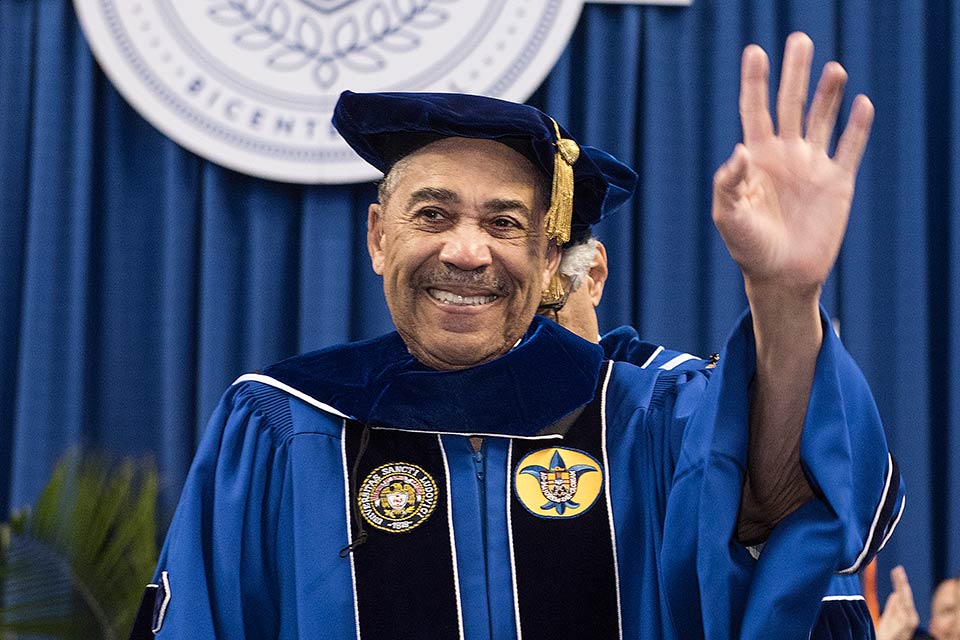William L. Clay Sr., 1931-2025
07/21/2025
One of Saint Louis University’s first African-American graduates and Missouri’s first Black congressman, William L. Clay Sr. (A&S ’53) died July 17, 2025. He was 94.

William “Bill” Lacy Clay Sr. (A&S '53) waves to the crowd during SLU's 2018 commencement ceremony where he received an honorary degree for his decades of service to St. Louis. Photo by Steve Dolan.
The first African-American to represent Missouri in Congress, Congressman Clay served 32 years in the U.S. House of Representatives and was a founding member of the Congressional Black Caucus.
“We are deeply saddened by the passing of Congressman Clay, a towering figure in the fight for civil rights and social justice — both nationally and here in St. Louis,” said Rochelle D. Smith, SLU’s vice president for diversity and innovative community engagement. “We are sending our prayers and deepest sympathies to the entire Clay family.”
Born April 30, 1931, in St. Louis, Congressman Clay was one of nine children raised in a North St. Louis tenement apartment without indoor plumbing or hot water. He began working at age 13 — first as a janitor, then as a tailor in a local clothing store.
Congressman Clay excelled academically, and after graduating from a local Catholic high school, he attended Saint Louis University, where he earned a bachelor’s degree in history and political science in 1953.
Shortly after graduating from SLU, Congressman Clay was drafted into the U.S. Army. While serving, he organized a boycott of a base barbershop to protest its policy of serving Black soldiers only one day a week — an early demonstration of the activism that would define his life.
In 1959, he won his first elected office as alderman of the city’s 26th Ward in a major election upset. He remained a vocal advocate for civil rights, organizing protests against discriminatory practices at local theaters, restaurants and businesses. In 1963, he was jailed for more than 100 days for his role in a demonstration against a St. Louis bank’s discriminatory hiring policies.
In 1968, he was elected to Congress, defeating five primary opponents and winning a competitive general election. Once in office, he quickly became known as an outspoken advocate for the underrepresented. “I represent those who are in need of representation,” he told The New York Times in 1982. “I have no intention of representing those powerful interests who walk over the powerless people.”
Throughout his congressional career, Congressman Clay sponsored more than 100 bills that became law. He played a key role in securing the Family and Medical Leave Act and led efforts to amend the Hatch Act to expand political freedoms for federal workers. He also fought to increase the federal minimum wage, reduce public school class sizes and expand college grant access for low-income students, among other priorities.
Known on Capitol Hill for his principled independence and fiery rhetoric, Congressman Clay remained unapologetic in his convictions. “I didn’t get so tied to the job that it stopped me from speaking out,” he said in a 1999 interview with the St. Louis Post-Dispatch. “People used to say to me, ‘How can you do that? You won’t get re-elected.’ I would say, ‘I didn’t come here to stay forever.’”
When he retired in 2001, he was the third most senior member of the U.S. House of Representatives. His son, William Lacy Clay Jr., succeeded him, making them only the second African-American father and son to serve in Congress.
Throughout his life, Congressman Clay remained deeply committed to education. In 1983, he established the William L. Clay Scholarship & Research Fund to support academically promising high school seniors from Missouri’s 1st Congressional District who demonstrated financial need.
On July 1, 2025, the fund transitioned to establish the William L. Clay Sr. Institute of Civic Engagement and Economic Justice within SLU’s Division of Diversity and Innovative Community Engagement. The Institute was launched with a $400,000 investment to support immersive learning experiences that help students better understand — and respond to — local and national social and economic challenges through civic engagement.
“Through the generous support of Congressman Clay and his family, his lifelong commitment to equity, dignity and service will continue to shape our mission and inspire our students for generations to come,” Smith said.
SLU awarded Congressman Clay an honorary degree in 2018 for his extraordinary contributions to public service and education. In 2023, he received the University’s Pioneer Award, an annual honor recognizing alumni whose leadership has paved the way for others.
Congressman Clay was preceded in death by his wife of more than 70 years, Carol Johnson Clay, in February 2025. He is survived by his son, William Lacy Clay Jr.; two daughters, Vicki Clay and Michelle Clay; five grandchildren; and two great-grandchildren.
Funeral arrangements are pending.
Latest Newslink
- Belize2020 Looks Ahead at SLU SummitEarlier this summer, Belize2020 organized a summit at Saint Louis University. Ten years after the coalition was created, with strong support from SLU to support Jesuit ministries in Belize, organizers felt the time was right to meet again.
- A Camp Friendship that Stirred Up Lifelong BondsIn the summer of 2005, Mary Kate Keenoy (Chaifetz Grad '22) and Genevieve Willman met at SLU's Gardens to Tables culinary camp. What started as a shared interest in cooking grew into a lasting friendship that has endured for two decades.
- Bruce Bacon, M.D.: 1949-2025Bruce Bacon, M.D., professor emeritus of internal medicine, died Sunday, July 6, 2025. He was 75. Bacon was known globally for his expertise in all aspects of clinical hepatology, specifically hemochromatosis, viral hepatitis, chronic liver disease / general hepatology, and liver transplant. Bacon was also a member of the research team that discovered the gene for hemochromatosis, HFE, in 1996.
- SLU Launches William L. Clay, Sr. Institute of Civic Engagement and Economic JusticeThe Clay Institute will provide immersive learning experiences and hands-on training that address the social and economic challenges facing the St. Louis region and the nation. Institute programming will be available to all students with an interest in civic engagement and democratic participation.
- SLU Research Explores Depression's Ripple Effect on DiabetesA study conducted by researchers at Saint Louis University found that patients with depression were more likely to have uncontrolled diabetes over time and that depression contributes to a heightened economic burden to diabetes management.
- SLU/YouGov Poll: Statewide Cell Phone Ban for Missouri Schools Popular with VotersGovernor Mike Kehoe has signed Senate Bill 68 into law, enacting a statewide ban on the use of personal electronic devices, including cell phones, tablets, and smartwatches, throughout the school day in Missouri public and public charter schools.












